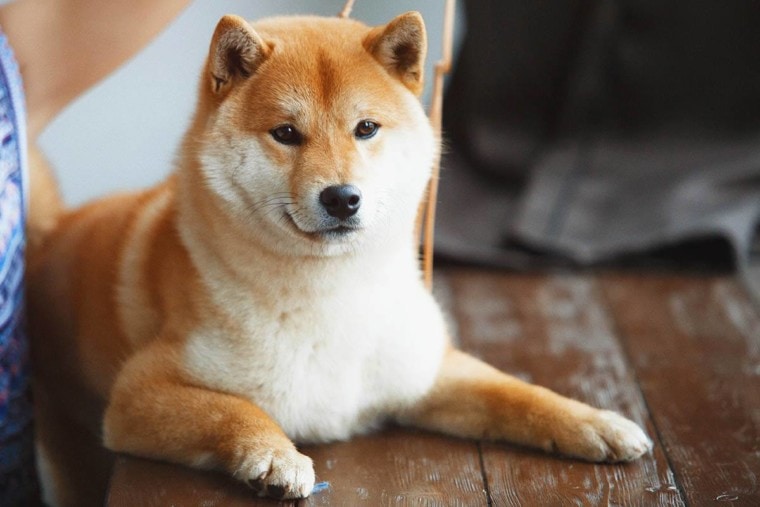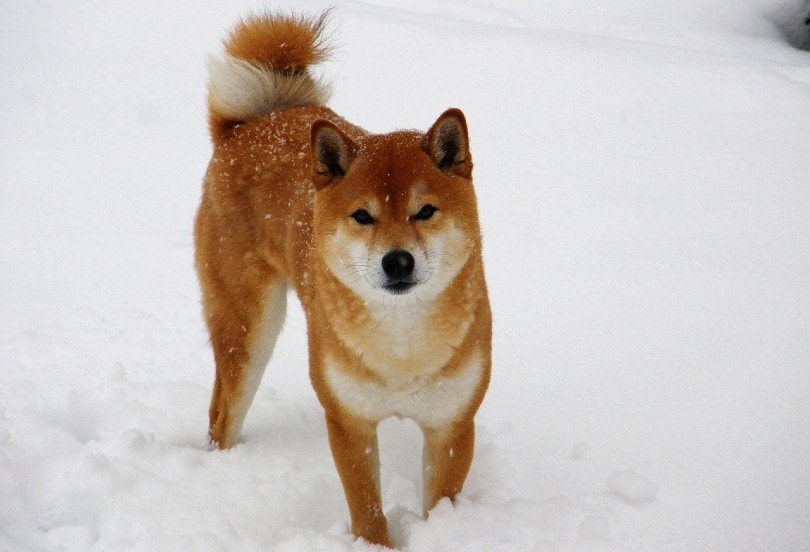
Click Below to Skip Ahead
If you’re looking for a confident little dog that resembles a fox, look no further than the Shiba Inu. This lively dog originated in Japan and is the fourth most popular dog breed there today. They were brought to America as pets after WWII by American servicemen. They are also called Shiba Inu in the plural form.
Breed Overview
Height:
13 – 17 inches
Weight:
17 – 23 pounds
Lifespan:
12 – 16 years
Colors:
Red, black, tan, sesame, cream
Suitable for:
Families with children, country or city life, singles or couples
Temperament:
Loving, intelligent, bold, courageous, independent, playful
The Shiba Inu was originally bred to flush small game and hunt wild boar. That instinct hasn’t left them, and they have a high prey drive today. While this is a friendly dog, they should be watched carefully around small animals.
Today, the Shiba Inu is a companion dog but one that won’t constantly pester you for attention. They are friendly but independent. While they have a stubborn streak, they’re also highly intelligent. They can be possessive of their belongings and their people. Training and proper socialization can minimize this behavior.
These keen and alert dogs are entertaining, fun, and loyal companions. Let’s find out more about the delightful Shiba Inu.
Shiba Inu Characteristics
Shiba Inu Puppies

To ensure the health of your puppy, it’s best to ask a reputable breeder who is dedicated to preserving the integrity of the breed. Red flags include breeders with multiple breeds of puppies available at once, breeders who refuse to let you see or visit the puppies before purchase, and those who can’t supply any veterinary paperwork about the puppies’ health. Another factor affecting the Shiba Inu is their coat coloring. Red Shiba Inu puppies are the most expensive, while cream Shiba Inu puppies cost much less.
If you’re looking to adopt your dog through a Shiba Inu rescue, the cost will be much cheaper. You may have to adopt an older dog and not a puppy. But you will still be getting a purebred Shiba Inu for a fraction of the cost and saving a life in the process.
Temperament & Intelligence of the Shiba Inu
Their independence and stubbornness give Shiba Inu the reputation of being hard to deal with, but understanding these traits can make it easier. While they’re intelligent dogs that can be trained, they may also refuse to do what they’re told if they don’t feel like doing it. Shiba Inu are strong-willed dogs that can be aloof at times. Their temperaments are often determined by genetics. When choosing your puppy, look for one that is curious, playful, and willing to engage in human interaction.

Are These Dogs Good for Families? 👪
Shiba Inu make wonderful family dogs. They’re active and love to run, so a fenced backyard is recommended. They can play well with children. This a loyal and devoted breed that can also be a good watchdog because they are naturally wary of strangers.
Does This Breed Get Along With Other Pets?
Shiba Inu can be assertive and territorial, especially when males encounter other male dogs. Shiba Inu also don’t share well. They are possessive and will guard their toys and food. Since they have a strong prey drive, they shouldn’t be in a home where small animals roam free. Rabbits and guinea pigs are not ideal companions for this dog.
Training and socialization will help your Shiba Inu get along with other animals, like dogs and cats, so that they can be a pleasant family companion. If you are bringing a Shiba Inu into your home as a puppy, they will have a much easier time getting along with the established resident animals. Bringing a new puppy into your home with an adult Shiba Inu may take more time for the relationship to blossom.
Things to Know When Owning a Shiba Inu
Food & Diet Requirements 🦴
The recommended Shiba Inu diet is 1–1.5 cups of high-protein, low-carb kibble per day, divided into two meals. This will vary depending on your dog’s age, weight, and activity level. Shiba Inu are highly active dogs, so they will need more calories to support this. High-quality food will be packed with nutrients to keep them satisfied and energized. This breed is prone to becoming overweight, so make sure that their food is properly measured and that they are getting the correct number of calories each day.
Exercise 🐕
Shiba Inu are active dogs. They love to play and go for walks. To keep your dog happy, they will require at least 30–60 minutes of exercise each day. A fenced-in yard is ideal. If that isn’t possible, walking them or bringing them along on light jogs will keep them from becoming frustrated. If Shiba Inu don’t get enough exercise, they can become destructive in the house. A bored Shiba Inu will make up their own things to do inside to keep themselves entertained.
Never exercise your dog off-leash in open areas. Shiba Inu have high prey drives and like to run. This combination is dangerous. To prevent them from running off, make sure they are never off-leash except in secure areas.
Training 🎾
Shiba Inu are easy to housebreak because they don’t like to go potty in their living spaces. This makes that part of training easy.
Obedience classes, preferably with a trainer who understands the breed’s quirks, are recommended for the Shiba Inu, starting from puppyhood. These classes can also provide the socialization that they need to grow into well-adjusted dogs.
Grooming ✂️
The classic teddy bear look of the Shiba Inu is partly due to their thick undercoat. This undercoat heavily sheds twice a year. They require regular and frequent brushing to help remove this hair and keep their coats healthy and smooth.
Bathing should not occur often, or else the dog’s skin could dry out. Whenever you notice that your dog is dirty or starting to develop an odor, you can throw them in the tub. Usually, Shiba Inu are bathed every 3–4 months.
Nail clipping and teeth cleaning are important. Brush your dog’s teeth daily to help reduce the plaque and tartar that can lead to periodontal disease.
Health and Conditions 🏥
Purchasing your puppy from a breeder who has had the puppy’s parents health-checked before breeding is the best way to make sure you’re receiving a healthy dog. However, any dog can develop diseases or health issues. Some develop due to genetics and others just happen. Here are a few conditions to be aware of with your Shiba Inu.
Serious Conditions
Minor Conditions
Male vs. Female
Genetics, their environment, and how they are raised will all affect a dog’s temperament. There are a few anecdotal differences between males and females when it comes to personality, though.
Females tend to be more cautious and reserved around new people or experiences than males. Males are friendlier and more outgoing.
Males can be dominating and territorial, especially when they are around other male dogs. Neutering your male Shiba Inu may help significantly reduce this behavior.
Male Shiba Inu are also more active and have more energy. Females have lower activity levels and are calmer.
Males are more playful and may be easier to train. They are eager to please. Females can also be trained well with the proper methods. Both sexes are intelligent.
Male Shiba Inu tend to be bigger than females, both in height and weight.
3 Little-Known Facts About the Shiba Inu
1. They shed excessively and then some.
Many breeds of dogs shed. But a Shiba Inu will take this to the next level. They shed their undercoat twice a year, but the process can feel never-ending. If you own this dog, you’ll need a quality vacuum cleaner and a durable dog brush.
A Shiba Inu will shed so much, people can spin their fur into yarn and use it to knit!
2. What is that wailing sound?
That’s just the Shiba scream! These dogs don’t normally engage in excessive barking. However, you will know when they’re feeling a certain way. Their impressive moaning is somewhere between a howl and a whine. This sound being belted out from the vet’s office as the Shiba Inu is having their nails trimmed can be quite alarming. Listen for yourself!
3. Flat ears mean happiness.
We normally see dogs lowering their ears as a sign of fear or aggression. When Shiba Inu do it, though, they are expressing their happiness through their famous airplane ears. Sometimes they will curve their mouth into a grin at the same time. If your Shiba Inu does this, they’re enjoying themselves.
Final Thoughts
Shiba Inu are adorable dogs that look like stuffed animals. They have strong personalities and high prey drives from their history as hunters. They make great family pets if they are well-socialized and trained.
Shiba Inu are escape artists, so it’s best to make sure you only have them off-leash in an enclosed area. They are active dogs that love to run and play.
If you don’t mind an independent dog that sheds incessantly — and sometimes lets out a Shiba scream — this is the breed for you. Whether you have children or live alone, this dog will be a loyal companion to their people and keep you entertained with their silliness.
Both males and females make great pets. There are several differences between the two, but nothing drastic. If your Shiba Inu is provided a loving home where their needs are met, that’s all they need to thrive.
Putting time into training your Shiba Inu is well worth the rewards that you will get in return with this spunky little dog.
See Also:
- Male vs. Female Shiba Inu: What Are the Differences?
- How Much Does It Cost to Own a Shiba Inu? Updated Price Guide
Featured Image Credit: Akbudak Rimma, Shutterstock








